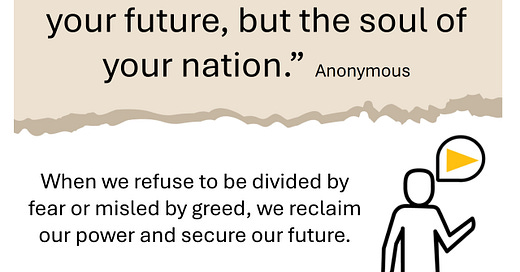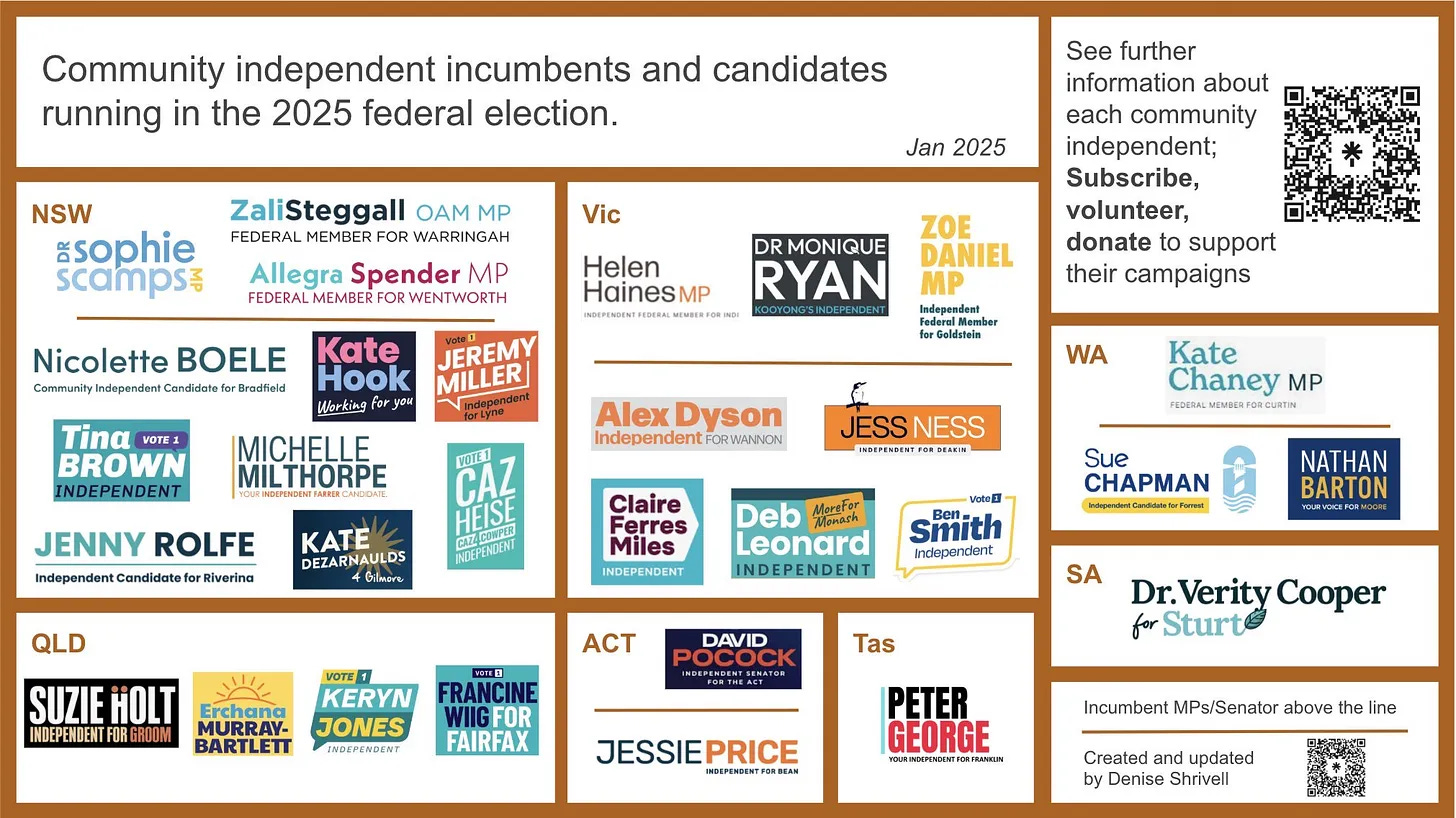Australia at the Crossroads: Resisting the Trumpian Turn in Our Democracy
How Peter Dutton’s divisive tactics and billionaire-backed agenda threaten to reshape Australia’s future – and why we must act now to protect our democracy, equality, and environment
In the dim light of Australian politics, a shadow looms large, one that echoes the divisive and destabilising tactics of Donald Trump. As we edge closer to the 2025 federal election, it's crucial for Australians to recognise this shadow, cast by Peter Dutton and his Liberal National Coalition (LNP), bolstered by the fossil fuel industry and billionaires like Gina Rinehart. Here's why we must be vigilant.
The Trumpian Playbook in Australian Politics:
Peter Dutton, with his hardline stance on immigration, crime, and energy policy, isn't merely a politician; he's a harbinger of Trump's political style. His rhetoric often mirrors Trump's, stoking fears about national security and cultural identity, aiming to fracture rather than unite. But it's not just about style; it's about substance.
Dutton's past actions serve as a significant indicator of his policy direction, revealing a pattern that should not be ignored. His policies seem less about serving the public interest and more about aligning with the agendas of those funding his campaign—those same entities that thrived under Trump's administration. His history of supporting tax cuts for the wealthy, advocating for stringent immigration policies, and his recent push for nuclear energy over renewables, all point towards favouring certain corporate interests.
The influence of billionaires on policy isn't a novel issue, but the extent and directness observed in the U.S. during Trump's tenure are concerning. In Australia, this trend could lead to a government influenced not by the collective will of the people but by the financial power of a select few, crafting policies that primarily benefit the elite.
Furthermore, Dutton's approach to policy is notably light on specifics and detail when it comes to sharing with the public, often leaving much to speculation. However, what is not being said is just as important and must be scrutinised, as it might reveal the true beneficiaries of his proposed governance.
The Influence of Fossil Fuel Tycoons:
The fossil fuel industry, particularly coal and gas, sees Dutton as a protector of their interests. His push for nuclear energy isn't about innovation or sustainability but a strategic move to prolong the life of fossil fuels. By advocating for nuclear power, which won't be operational for decades, Dutton ensures that coal and gas remain central to Australia's energy mix, directly benefiting industry giants. This delay in transitioning to renewables will not only keep energy prices high but will also exacerbate climate change impacts, hitting hardest the average Australian through increased living costs and environmental degradation.
Billionaires' Backing and the Real Agenda:
Gina Rinehart, Australia's wealthiest individual, has been an open supporter of Trump's policies and now Dutton's campaign. Her involvement isn't altruistic; it's strategic. Under a Dutton-led government, policies would likely favour tax breaks for the ultra-rich, deregulation of mining activities, and a rollback on environmental protections. The message is clear: protect the wealth of the few at the expense of the many. This mirrors the U.S. where Trump's executive orders, initially focusing on slashing regulations and environmental protections, have paved the way for billionaire influence over public policy, often at the cost of public welfare.
What a Dutton Government Would Mean for Australians:
Here are some of Peter Dutton's recent policy positions and how they might adversely affect Australians:
1. Nuclear Energy:
o Policy: Dutton has proposed the development of nuclear power in Australia, which includes lifting the ban on nuclear energy to address climate change and energy security. He suggests small modular reactors (SMRs) could be operational by 2035.
o Adverse Effects:
§ Economic Cost: The financial cost of establishing nuclear power in Australia could be significant, with high initial capital expenditure and ongoing maintenance costs. This could lead to higher energy prices for consumers before any benefits are realised.
§ Environmental and Safety Risks: There are concerns about nuclear waste management, potential environmental disasters, and the time it would take for nuclear energy to contribute effectively to reducing emissions, thus delaying necessary action on climate change.
§ Delay in Renewable Transition: Focusing on nuclear might divert investment and attention away from renewable energies, which are already more cost-effective and quicker to deploy, potentially slowing down Australia's green transition.
2. Immigration Policy:
Policy: Dutton advocates for a significant reduction in Australia's permanent migration intake and caps on international students at metropolitan universities, aiming to address housing shortages and job competition.
Adverse Effects:
Economic Impact: Reducing migration could lead to labour shortages in key sectors like healthcare, technology, and construction, which rely on skilled migrants. This could hamper economic growth and innovation.
Social Impact: Such policies might increase social tensions by framing migrants as competitors for resources, potentially fuelling xenophobia and racism.
Housing Market: While aimed at easing housing pressures, these policies might not address underlying issues like land use, zoning, or housing supply, potentially leaving the root causes of housing unaffordability unaddressed.
3. Climate and Energy:
Policy: He has criticised the current government's climate targets as impractical and suggested that under his leadership, Australia might not meet its Paris Agreement commitments.
Adverse Effects:
Climate Impact: Withdrawal or reluctance to meet international climate commitments could increase Australia's vulnerability to climate change effects like bushfires, drought, and sea-level rise, impacting agriculture, water resources, and biodiversity.
International Reputation: Australia could lose credibility on the global stage, affecting trade, diplomacy, and participation in international climate and environmental funds.
4. Tax and Economic Policy:
Policy: Dutton has hinted at tax reforms favouring higher-income earners, similar to the Stage Three tax cuts he supported previously.
Adverse Effects:
Income Inequality: Such tax policies could widen the gap between rich and poor, reducing government revenue for public services like health, education, and welfare.
Public Services: Less funding for public services might lead to privatisation or reduced access to quality healthcare, education, and other social services.
5. Social Policy:
Policy: Dutton's approach often involves cultural and identity politics, with a focus on traditional values and national identity over multiculturalism.
Adverse Effects:
Social Cohesion: This could lead to greater social division, potentially increasing community tensions and reducing social cohesion, particularly affecting minority groups.
These policies, based on Dutton's statements and the current political climate, suggest potential risks to economic stability, environmental health, social harmony, and individual rights in Australia. They echo concerns raised during Trump's recent and current administrations, where similar policy directions led to significant societal and economic impacts.
If Dutton mirrors Trump, we should take his words very seriously. Given Trump's track record of turning his rhetoric into policy, and considering what Dutton has said, we need to be extremely cautious. These are not mere anticipations; they're warnings based on current statements and data, suggesting that the outcomes could indeed reflect the rhetoric if policy execution follows suit.
Learning from American Mistakes:
Following Donald Trump's re-election in November 2024, the immediate aftermath has seen a resurgence in public queries like 'what is a tariff?' and 'how can I change my vote?', signaling a populace once again confronting the realities of their electoral decision. For instance, in his first week in office in late January 2025, Trump has:
Stopped funding to cancer research
Left the world health organisation
Left Paris climate agreement
Called on federal health agencies to temporarily halt their external communications, including public reports on public health incidents
Removed price protection for key diabetes drugs
Closed the office to protect against gun violence in schools
Threatened Denmark about Greenland
Closed the office of consumer protection
Halted funding to Ukraine
Tried to repeal the 14th amendment (judge halted for now)
Outlawed DEI programs across the whole govt
Allowed a Nazi salute at his inauguration without comment
This is not diplomacy or global leadership or politics as usual, it is reckless and sowing the seeds of social destruction.
As Australians approach our own election, it's vital to scrutinise these policy shifts to prevent a similar scenario of "buyer's remorse." We must pose critical questions about healthcare, environmental policies, and social equity to ensure our electoral choices reflect our values and needs, not just the interests of the powerful few.
The Call to Action:
Since Tony Abbott's rise to power in 2013, I've felt an ominous sense of foreboding about Australia's future, caught between a regressive path towards autocracy or one of shared progress. For more than a decade, I've warned of this crucial juncture, and now we stand at a critical crossroads, poised to choose between a society that advances together or one that regresses to favour a select few.
Australians, we are at a pivotal moment. Do we allow a future where policy is dictated by the affluent elite, or do we champion our values of fairness, environmental stewardship, and social unity? Peter Dutton's agenda, supported by those who prioritise profit over people, serves as a stark warning. This isn't merely about opposing a single politician or party; it's about protecting our democracy from the creeping influence of Trumpian-style governance.
Let's not be swayed by empty promises that benefit only a minority. We must demand transparency, accountability, and policies that truly reflect the well-being of all Australians. The decision we make now will echo through history, judged by either our vigilance or our apathy. Let this election affirm our dedication to an Australia that is inclusive, sustainable, and authentically ours.
Onward we press
Resources
Here is a list of quality independent MPs and canidates you and choose to vote for at the 2025 federal election: Not Shit Candidates List




